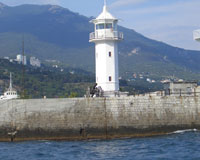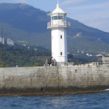
UKRAINE SEEKS CONTROL OF RUSSIAN NAVAL FACILITIES ON ITS SOIL
Publication: Eurasia Daily Monitor Volume: 3 Issue: 13
By:

Ukrainian state authorities seized the Yalta lighthouse on January 13 from Russia’s Black Sea Fleet, and a Ukrainian student organization is picketing the Russian radar station in Henychesk around the clock since January 15 with tacit approval from Kyiv authorities. The Ukrainian government wants Russia to agree to hand over by February all the 35 coastal installations (outside Sevastopol’s bays) that Russia’s Black Sea Fleet is using since 1997 without a legal basis.
Designated collectively as “hydrographic installations” and including mainly lighthouses and communications stations, these facilities are strewn along the Crimea’s coasts and are manned by Russia Black Sea Fleet personnel. Kyiv seeks to transfer them to the Ukrainian Transport Ministry’s Hydrographic Service for civilian use. Under the 1997 inter-state agreements, Russia’s fleet is stationed in the Crimea until 2017 for a lease payment of just under $100 million annually. Yet the Russian side is failing to pay for rent and electricity at many of the “hydrographic installations,” or is deeply in arrears on such payments.
The picket in Henychesk on the Azov Sea, amply televised in Ukraine, started one day after the Russia side had beefed up the guard by sending in 20 Marines from the main base in Sevastopol. As Ukraine’s Ministry of Foreign Affairs pointed out in a statement, the deployment was illegal: under the 1997 agreements, any movement of troops and materiel of the Russian Black Sea Fleet may only take place with the Ukrainian authorities’ approval. Compounding the violation of Ukrainian sovereignty, the guard hung up a sign, “Territory of the Russian Federation.”
Members of the Ukrainian Student Brotherhood are in charge of the picket. In Kyiv, National Security and Defense Council Secretary Anatoly Kinakh has expressed “gratitude to those NGOs that are focusing attention on this issue,” but cautioned against escalating the dispute (Channel Five TV [Kyiv], January 16).
The Brotherhood had picketed the Russian Black Sea Fleet’s Sevastopol’s headquarters in July and August 2005. On January 14, the Brotherhood and a Ukrainian police colonel unsuccessfully attempted to enter the perimeter of the Russian-used lighthouse at Cape Sarych. In connection with this incident, Ukraine’s Transport Minister Viktor Bondar issued a statement defining that installation as Ukrainian state property. Ukraine’s hydrographic service seeks to appoint the head of this and other installations.
In Moscow, Admiral Vladimir Masorin, the Commander-in-Chief of Russia’s Naval Forces, issued a communiqué terming these developments “pure provocation, an unfriendly act” (RIA, January 13). Masorin ordered Admiral Aleksandr Tatarinov, commander of Russia’s Black Sea Fleet, to Yalta for negotiations with Ukrainian authorities. Accompanied by a large group of senior officers and two Russia diplomats, Tatarinov was only received by the head of Yalta’s merchant port, who stood his ground. The Russian group left in a show of anger: “We were not met with understanding,” the Fleet’s spokesman concluded (NTV Mir, January 15).
Masorin, publicly backed by Russian Defense Minister Sergei Ivanov, has announced that the Marine guard is being further reinforced at some or most installations in the Crimea. For its part, Russia’s Ministry of Foreign Affairs portrays the Ukrainian authorities’ position on this issue as contravening the “new atmosphere” in bilateral relations, established by Presidents Vladimir Putin and Viktor Yushchenko at their January 11 meeting (see EDM, January 12). Russian MFA statements are obliquely but unmistakably blaming Ukraine’s Ministry of Foreign Affairs for these developments in the Crimea. Without naming Minister Borys Tarasyuk, Moscow’s statements insinuate that his Ministry is “out of step” with the President’s policy, and are rhetorically asking “who speaks for Ukraine: the presidential administration or the MFA?”
Russia controls those hydrographic installations de facto and operates them without a legal basis. The 1997 agreements left the resolution of this issue to be settled by follow-up agreements, but these were never signed. Various proposals and drafts were discussed from 1997 to 2003 regarding the installations’ transfer to Ukrainian control, or Russian leasing, or joint use. Moscow now mistakenly describes some of those documents as “agreements.”
After the negotiations had come to a halt in 2003, the Sevastopol economic court (which Sergei Ivanov now dismisses as a “village court”—Interfax, January 15) and other Ukrainian courts ruled in favor of the Transport Ministry’s Hydrographic Service on several of the installations and ordered the handover. These rulings have not been enforced, however. The Russian side claims that local courts may not interfere with inter-state agreements, but there are no inter-state agreements on the issue. Moscow insists that any decision can only be reached by mutual consent. Yet Russian physical control of the installations is a factor that distorts the negotiations toward a mutually acceptable solution.
In the absence of inter-state agreements, the only applicable legal framework is that of the sovereign state of Ukraine. Resolution along these lines is a Ukrainian MFA priority since the regime change in Ukraine a year ago. The subcommission on the Black Sea Fleet, which forms part of the inter-governmental commission chaired by the two presidents, is scheduled to meet on February 16, against the backdrop of agitated parliamentary election campaigning in Ukraine.
(Interfax, RTR Russia TV, UNIAN, Ukrainian Television Channel One, January 13-18)




